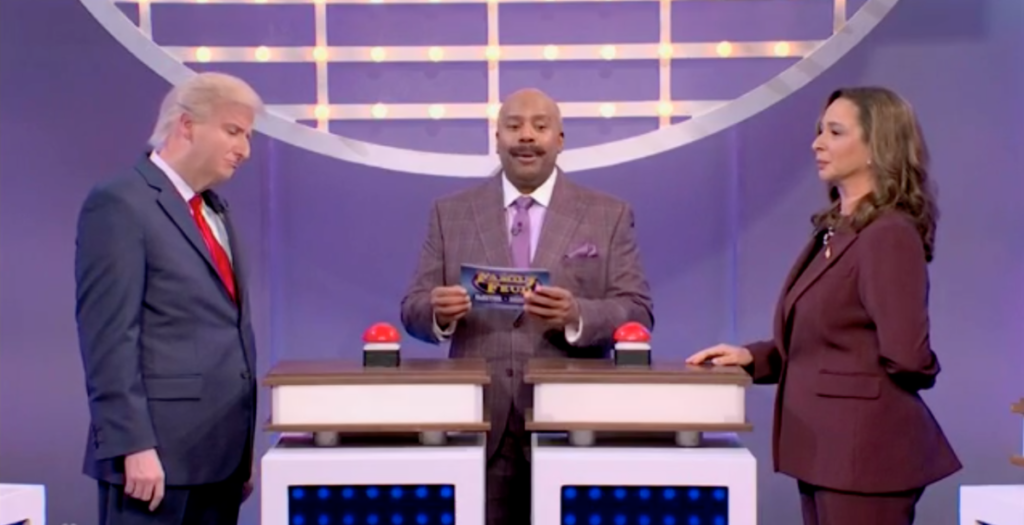On a recent episode of Saturday Night Live, Team Trump, portrayed by James Austin Johnson, went head-to-head against Team Harris led by Maya Rudolph in a parody of Family Feud. The sketch opened with an amusing twist—Trump lamented the absence of his wife Melania, who has been notably missing from public engagements during Trump’s recent campaign appearances. In a humorous dig at his relationship, Trump quipped that he thought she had been right next to him just two years prior, yet he instead introduced Don Jr. (played by Mikey Day) to the audience, underlining family dynamics mixed with political satire. J.D. Vance, a participant on Trump’s team, added to the comedic tone by lamenting the “wokeness” of contemporary culture, referring to a perceived shift in how characters like the Joker are portrayed, contrasting it with the family values he believed the show was promoting.
The competition began with a question about common items found in a glove compartment. Harris was quick to chime in with a lengthy anecdote about her middle-class roots, much to the annoyance of the host. When she finally delivered her answer—“a big ol’ glock”—both comedic and political tones blended seamlessly as her husband, played by Andy Samberg, expressed admiration for her answer. As the game progressed, humorous exchanges unfolded, including a moment where Joe Biden, played by Dana Carvey, made an amusing attempt to purchase a vowel and threatened Trump with a “knuckle sandwich,” but ultimately failed to give a correct response. The blend of absurdity from characters encapsulated the portrayal of American politics through comedic lens, revealing how humor can be drawn from the dysfunction and theatrics of political figures.
As the game moved on, Trump faced the humorous scrutiny of his own lackluster answers, becoming the comedic focal point of the sketch. In a convoluted response to the glove compartment question, he went on an unrelated rant referencing Seinfeld and insinuating that immigrants were harming America by “eating pets.” His rambling answer illustrated his trademark speaking style, marked by erratic tangents and an inability to stay on topic, effectively satirizing his real-life speaking habits. This moment came with the inevitable punchline—a failed answer on the board, where the host, in a final jab, asked for “dementia,” humorously underscoring Trump’s own verbal disarray.
The absurdity continued as Biden and Trump’s performances were juxtaposed, showcasing the comedic dynamic between the former and current president. The writing played on public perceptions of both figures, using humor to highlight their peculiar behaviors. Americans watching the sketch could appreciate the imaginative critique of reality interspersed with the playful interactions between familiar characters. As guests failed to deliver expected answers, the laughter was emblematic of a broader commentary on political discourse, with humor acting as a means of coping with the weight of real-life events.
Despite the comedic setting, the performance revealed deeper societal issues through the lampooning of political figures. The quick wit of the SNL cast brought to light the way these personalities often exist in public consciousness—not only as leaders but as exaggerated caricatures of themselves. The humor was twofold, poking fun at their political missteps while simultaneously addressing the larger issues affecting American society, like the misrepresentation of identity or governance lost in communication.
Ultimately, Saturday Night Live’s skit became more than just a parody of Family Feud; it transformed into a microcosm of the political landscape in America. Through humor, the show underscored the absurdity within today’s political stage, as characters embodied not just their roles but also the broader commentary on the political climate. It reiterated the role of comedy in addressing serious issues, allowing a space for people to engage with the chaos surrounding identity, family dynamics, and political personas, blending laughter with insightful reflection and satire.

